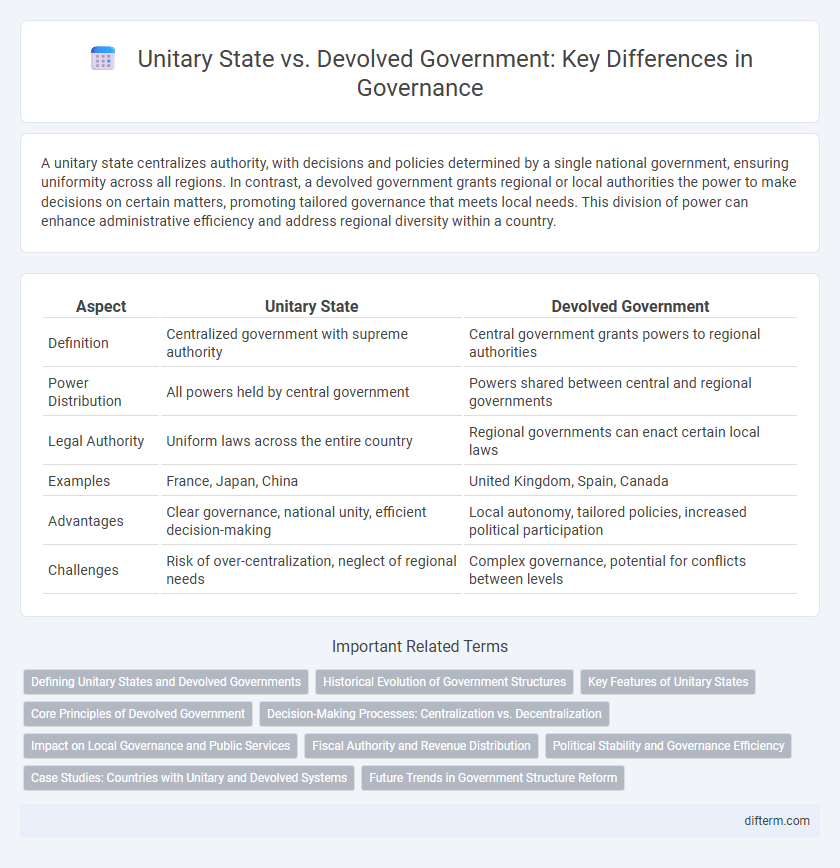A unitary state centralizes authority, with decisions and policies determined by a single national government, ensuring uniformity across all regions. In contrast, a devolved government grants regional or local authorities the power to make decisions on certain matters, promoting tailored governance that meets local needs. This division of power can enhance administrative efficiency and address regional diversity within a country.
Table of Comparison
| Aspect | Unitary State | Devolved Government |
|---|---|---|
| Definition | Centralized government with supreme authority | Central government grants powers to regional authorities |
| Power Distribution | All powers held by central government | Powers shared between central and regional governments |
| Legal Authority | Uniform laws across the entire country | Regional governments can enact certain local laws |
| Examples | France, Japan, China | United Kingdom, Spain, Canada |
| Advantages | Clear governance, national unity, efficient decision-making | Local autonomy, tailored policies, increased political participation |
| Challenges | Risk of over-centralization, neglect of regional needs | Complex governance, potential for conflicts between levels |
Defining Unitary States and Devolved Governments
Unitary states centralize political power within a single national government, which holds ultimate authority over all administrative divisions. Devolved governments grant autonomous powers to regional or local entities, allowing these subnational units to legislate and manage specific policy areas independently. This decentralization enhances local governance while the central government retains sovereignty.
Historical Evolution of Government Structures
The evolution from unitary states to devolved governments reflects a historical shift in political power distribution aimed at accommodating regional identities and demands for local autonomy. Unitary states centralized authority to maintain uniform governance, but rising cultural diversity and economic disparities prompted decentralization to devolved administrations with legislative competencies. This transition is evident in nations like the United Kingdom, where devolution initiated in the late 20th century established Scotland, Wales, and Northern Ireland with varying degrees of self-government while preserving overall sovereignty.
Key Features of Unitary States
Unitary states centralize political power within a single, sovereign government that holds supreme authority over all administrative divisions. Key features include uniform legal frameworks, centralized policymaking, and a single constitution governing the entire territory without autonomous regional governments. This structure ensures consistent implementation of laws and policies but limits regional self-governance compared to devolved governments.
Core Principles of Devolved Government
Devolved government operates on the core principles of subsidiarity, accountability, and autonomy, allowing regional governments to exercise legislative and administrative powers independently within a unitary state's framework. This system promotes local decision-making tailored to regional needs while maintaining national unity and sovereignty. Devolution enhances democratic participation by bringing governance closer to the people, contrasting with the centralized authority characteristic of a purely unitary state.
Decision-Making Processes: Centralization vs. Decentralization
Unitary states concentrate decision-making authority within a central government, enabling uniform policies and streamlined governance across the entire nation. In contrast, devolved governments distribute power to regional or local authorities, fostering tailored policies that address specific community needs and encourage greater local participation. This decentralization enhances responsiveness and accountability but may also lead to variations in policy implementation across regions.
Impact on Local Governance and Public Services
A unitary state centralizes authority, often resulting in uniform policies and streamlined decision-making but may limit local autonomy and responsiveness in public services. In contrast, devolved government allocates powers to regional or local authorities, enhancing tailored governance and improving service delivery by addressing specific community needs. This decentralization fosters greater citizen participation and accountability in local governance, potentially leading to more effective and culturally sensitive public services.
Fiscal Authority and Revenue Distribution
In a unitary state, fiscal authority is centralized, with the national government controlling most revenue collection and distribution, ensuring uniform allocation across regions. Devolved governments possess varying degrees of fiscal autonomy, enabling regional authorities to levy taxes and allocate budgets according to local priorities, which can lead to disparities in revenue and public services. This fiscal decentralization often requires complex intergovernmental transfers to balance resources and maintain equitable service provision.
Political Stability and Governance Efficiency
Unitary states centralize authority, enabling consistent policy implementation and streamlined decision-making that often enhances political stability and governance efficiency. Devolved governments distribute power to regional authorities, allowing tailored policies that address local needs and potentially improve public satisfaction but may lead to coordination challenges and political fragmentation. Balancing central control with regional autonomy is crucial for optimizing governance outcomes and maintaining overall national unity.
Case Studies: Countries with Unitary and Devolved Systems
France exemplifies a unitary state with centralized authority, where decisions predominantly flow from the national government to local administrations. The United Kingdom, by contrast, operates a devolved system granting Scotland, Wales, and Northern Ireland legislative powers to manage regional matters while retaining overall sovereignty. Comparative analysis reveals that devolved governments often enhance regional representation and policy responsiveness, unlike unitary states with uniform governance structures.
Future Trends in Government Structure Reform
Unitary states are increasingly exploring decentralized models to improve local governance and citizen engagement, driven by technological advancements and demands for regional autonomy. Devolved governments are expected to adopt more adaptive frameworks, incorporating digital platforms for enhanced transparency and public participation. Future reforms will likely emphasize a balance between national cohesion and regional empowerment to foster efficient policymaking and address diverse community needs.
unitary state vs devolved government Infographic

 difterm.com
difterm.com